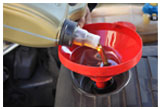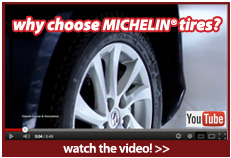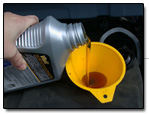Posted on 11/14/2013
Global warming seems to be affecting snow fall year after year, and one would expect that technologies such as front wheel drive, traction control and even four wheel drive would tend to lessen the need for a change of tires. So, do we really need Winter Tires?The answer is YES and believe it or not, more so than ever. One aspect of the motor vehicle which has not really changed over the past year’s, is the contact patch, or the surface area within which our car comes in contact with the road. Even today, the area that each of our wheels comes in touch with the road is not much larger than the size of one of our hands. It really is not much when one thinks about it, and therefore, we want to be able to maximize the traction within this area as much as we can in order to get the most from our tires. The other aspect not often mentioned is temperature, and that our all-season or summer tires become drastically less effective once th ... read more
Posted on 10/14/2013
MYTH 1 - My vehicle has 4WD, I do not need winter tires. FALSE These systems do provide optimized power transmission delivery but provide minimal assistance in transverse handling and braking situations. Important weight combined with higher ground clearance are other factors that affect negatively the stability and control of these vehicles. With the installation of winter tires, the driver can feel optimized levels of traction during all maneuvers including acceleration, braking and handling situations. MYTH 2 - I have ABS (antilock braking) I do not require winter tires. FALSE These advanced systems are designed for vehicle stability, power transmission, and controlled braking and alone are not substitutes for optimized traction grip during all types of winter driving maneuvers including braking, acceleration, and handling. MYTH 3 - It doesn’t snow that much anymore. I feel my all-season tires are my best choice. FALSE ... read more
Posted on 8/1/2013

How did we ever get along without air conditioning in our cars? It's a feature we take for granted until, suddenly, it's blowing hot air. In the past few years, many owners have discovered that fixing an inoperative air conditioner can cost a few hundred dollars or more, depending upon the make and model of vehicle. The reason is that the old standby R-12 refrigerant, trade named DuPont Freon, has been replaced by R-134a. Touted as being environmentally safer than its predecessor, R-134a has been standard since '94. If your older vehicle needs major repairs to the air conditioning system you can expect to replace refrigerant and the oil in the compressor in addition to the old components. You also may need to install a retrofit conversion. Do not allow anyone to mix refrigerants. They're not inter-changeable. You cannot add R-134a to your older air conditioner without first flushing the system. Further, according to Car Care Canada, some substitutes ... read more
Posted on 2/13/2013

Everyone knows that without gas your vehicle won’t run. Most people also know that oil is important. Engine oil lubricates, cleans, and cools critical parts of the engine. The oil's additives also help to suspend dirt, where it can be drained at the next oil change. The life-blood of your engine, engine oil consists of various weight mineral or synthetic oils combined with additives for engine protection. Oils may come in single or multi-grades and meet various oil performance standards. Multi-grade oils usually start out as single-grade base oils, such as SAE 10W. Then viscosity-index improvers are added to modify viscosity. The end result is an SAE 10W-30 oil capable of flowing like a 10W oil at cold temperatures and a 30W oil at higher temperatures. Check your owner’s manual to ensure you are using the proper grade of oil for your vehicle. Most people neglect the other fluids in their vehicle, these include: ... read more
Posted on 1/24/2013
What happens when your kids grow out of the backseat and into the driver's seat? Who's looking after their vehicles? Results from consumer research recently conducted clearly shows today's youth are neglecting their vehicles. This poses a safety threat to themselves, as well as others on the road. We are facing a generation gap when it comes to vehicle maintenance. Today's driving youth (18 to 24 years) don't know what their cars need and are not taking care of their vehicles. Youth are less likely to change their oil every 5,000 km than more experienced drivers. Many young people (22%) had no idea when to change it at all or wait until the oil light comes on. Only 45% of youth bring their vehicle in for maintenance at least once a year versus 76% of people over 50. 22% never bring it in or only when it breaks down and 34% wait for a warning light or a strange noise. 10% of young drivers reported that they never put air in their tires and an additi ... read more
Posted on 11/12/2012

As temperatures cool across the nation, drivers need to start thinking about winter driving conditions and how to protect themselves and their passengers on the road. While it's important to adjust driving habits to weather conditions, according to Marc Brazeau, President, Automotive Industries Association (AIA) of Canada, the most imperative thing Canadians can do to protect themselves and their loved ones is transition to winter tires. "The idea that all-season tires are as effective as winter tires is a dangerous misconception," said Brazeau. "The design and durability of winter tires improves performance and enhances safety in a variety of road conditions. They're the one and only choice for winter driving." Rubber in all-season tires starts to lose elasticity and harden at around 7°C, significantly reducing the tire's ability to grip the road ... read more
Posted on 7/26/2012
Summer Travel Season is Upon UsAdvice such as buying gasoline in the cool of the morning or leaving the tailgate down has been tried -- with disappointing results. There are a lot of smart ways to save on gas. For instance, you can use a website such as GasBuddy to find cheaper gas stations in your area, buy a more fuel-efficient vehicle or drive less aggressively so your car uses less gas. These are all proven methods for reducing how much you need to budget for gas, but there are other widely used methods that don't pass the smell test. Here are a few: Buy gas early in the morning. Gasoline is denser at colder temperatures, so the theory here is that if you fill up early in the morning while it's still cool out, you'll get more bang for your buck -- a gallon of gas bought cold will expand to be a little more than a gallon when it gets warmer. But as we explained in our look at c ... read more
Posted on 6/25/2012
Many cars nowadays have a cabin filter, which is built in the air conditioners. In the last decade many car air conditioning systems have been built with this type of air filters. The cabin air filter is placed outside the area of the engine. It helps in filtering the air which is entering into the air conditioning system. This helps in getting rid of a large amount of pollutants which can enter the cabin of the car. Thus it is useful for the people who are sitting in the vehicle as they are protected from the harmful elements. It has been seen in recent surveys that most of the vehicle owners do not know about this feature. Many of them do not even know whether or not their vehicle has cabin air filter. These filters have been in use for the last twenty years. During the middle part of the 1980s they have been used in the European vehicles. From the beginning of last decade they appeared in the American market. Nowadays these filters are quite common in many countri ... read more
Posted on 11/1/2011

A Note from Mark... This month we are featuring "oil changes." Why? Well there is a lot of talk and discussions going around the dinner table about "oil change intervals." There is a wide range of drain intervals from: 3 month/5000km to 12 month/24,000kms? What has changed? Well oil quality is better, but filters are lot smaller! The fuel is worse with the higher percent of ethanol, engines are smaller, more complex, run leaner and hotter (for lower emissions) with Turbo charging, variable valve timing, cylinders on demand, V-tec solenoids, mutli-timing chains, valve train solenoids, Direct Fuel Injection. To get every ounce of power from a litre of fuel, most 4 cylinder engines produce more power than your Grandfather's V-8 Buick ever did on a good day and on 1/3 the fuel and close to zero emissions. So what is right for you? Well I have modified the service intervals based on what we see in the industry. Our maintenance plans a ... read more
Posted on 9/28/2011

Do you know someone you could refer to Mark's Auto Service? The best way that any small business can grow is by word of mouth. We REALLY appreciate these referrals, as without them we wouldn't be here! For quite some time we have been thanking our customers for referrals by loading value onto their Loyalty Rewards Card! We probably haven't been doing the greatest job telling everyone about the program and what you can do to earn free or discounted services. To Earn Your Referral Dollars:Click on the Referral Card below and print the cards, or pick up a handful of cards at the shop. Write your name on the cards and hand them out to friends, family or anyone who has not visited us before. When they come in for service, you will earn $50.00 on your Rewards Card for your first referral and then $25.00 for each one after that!. You can keep the money for yourself OR we can donate all or a ... read more